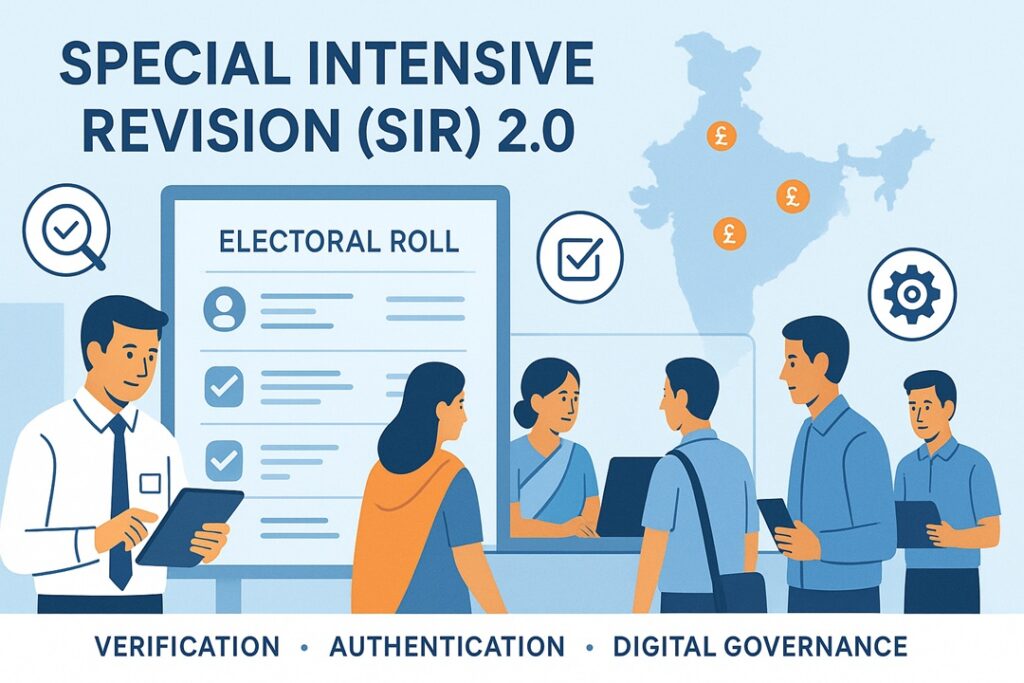Special Intensive Revision SIR 2.0: Challenges and the Road to Electoral Integrity

Context
The Election Commission of India has launched the Special Intensive Revision SIR 2.0 across 12 States and Union Territories to verify and update electoral rolls. The process has raised concerns about exclusion of eligible voters and lack of procedural safeguards.
Meaning of SIR 2.0
Definition
SIR 2.0 is an intensive, house-to-house verification exercise conducted by Booth Level Officers to ensure accurate inclusion of all eligible voters.
Purpose
To update the electoral roll by identifying additions, deletions, corrections, and shifts in voter residence.
Coverage of SIR 2.0
States and UTs Included
Andaman and Nicobar, Chhattisgarh, Goa, Gujarat, Kerala, Lakshadweep, Madhya Pradesh, Puducherry, Rajasthan, Tamil Nadu, Uttar Pradesh, and West Bengal.
Previous Phase
SIR 1.0 was completed in Bihar.
Exclusion of Assam
Reason
Assam is excluded due to its unique situation involving the National Register of Citizens and ongoing citizenship scrutiny.
Process of SIR 2.0
Enumeration Stage
House-to-house verification by Booth Level Officers.
Draft Publication
Preparation and release of the draft electoral roll.
Claims and Objections
Opportunity for citizens to submit corrections, additions, or objections.
Notice and Hearing
Verification through hearings and field checks.
Final Publication
Release of the final updated electoral roll.
Appeal Mechanism
First Appeal
To the District Magistrate in case of deletion.
Second Appeal
To the Chief Electoral Officer if unsatisfied with the DM’s decision.
Documentation Framework
Accepted Documents
Includes identity cards issued by government authorities, birth certificates, passports, educational certificates, permanent resident certificates, forest rights certificates, caste certificates, NRC records where applicable, family registers, land allotment papers, and Aadhaar.
Enumeration Rule
No document is required during the initial enumeration stage.
Fear of Disenfranchisement
Key Concern
The documentation-heavy process may exclude genuine voters and resemble a citizenship verification mechanism.
Flaws in Revised Rolls
Statistical Issues
Decline in adult-elector ratios and disproportionate deletions of women and Muslim voters.
Data Integrity Concerns
Presence of duplicate or bogus entries.
Procedural Fairness Concerns
Lack of Safeguards
Insufficient checks make the process vulnerable to errors and external influence.
Institutional Credibility Issues
Perception of Bias
Past experiences, especially in Bihar, have raised concerns regarding the neutrality and transparency of the Election Commission.
Judicial Oversight Concerns
Scope of Review
The Supreme Court did not fully examine whether the Commission has clear legal authority or procedures governing such extensive revisions.
Impact on Internal Migrants
Residency Requirement
Migrants, particularly in Tamil Nadu, struggle due to rigid residency norms under Sections 19 and 20 of the Representation of the People Act.
Need for Social Audits
Purpose
Necessary to ensure transparency and public oversight.
Constitutional Basis
Articles 243A and 243J empower community-based monitoring.
Precedent
Decentralized gram sabha audits were conducted in 2003 under CEC J. M. Lyngdoh.
Reforms for Migrant Inclusion
Required Changes
Broaden the definition of ordinary residence, introduce portable voter registration systems, and simplify documentation for migrant workers.
Need for Clear Legal Guidelines
Legislative Requirement
Rules under the Representation of the People Act must clearly define powers, scope, timelines, and procedures governing SIR.
Independent Scrutiny Measures
Strengthening Accountability
Introduce third-party audits, public disclosure of deletion/inclusion lists, and a multilingual, time-bound appeal system.
Conclusion
SIR 2.0 is a significant initiative to strengthen electoral roll accuracy, but its success depends on transparent processes, legal clarity, and safeguards against exclusion. Ensuring that all eligible voters are included is essential to uphold the integrity of India’s democratic system.
Source : The Hindu
